Professional Identity 92434: Ethical Issues in Nursing Case Study
VerifiedAdded on 2022/11/10
|6
|1972
|87
Case Study
AI Summary
This case study delves into the ethical and legal complexities faced by a registered nurse, Sam, in providing care to a patient. The assignment focuses on ethical dilemmas concerning patient confidentiality, particularly when the patient, a minor, wishes to withhold information from her parent. It explores the ethical principles of autonomy, veracity, and fidelity, highlighting the nurse's responsibility to balance patient rights with legal obligations. The case study examines the nurse's decision-making process, emphasizing the importance of clinical assessment, counseling, and adherence to the nursing code of ethics. It also discusses the legal ramifications of confidentiality breaches and the importance of seeking informed consent whenever possible. The analysis includes relevant references to support the ethical and legal frameworks discussed, offering a comprehensive understanding of the challenges nurses encounter in practice and the strategies for addressing them effectively. The assignment underscores the significance of patient confidentiality in building trust and ensuring effective communication within the nurse-patient relationship, while also acknowledging the exceptions to confidentiality when patient well-being is at stake.
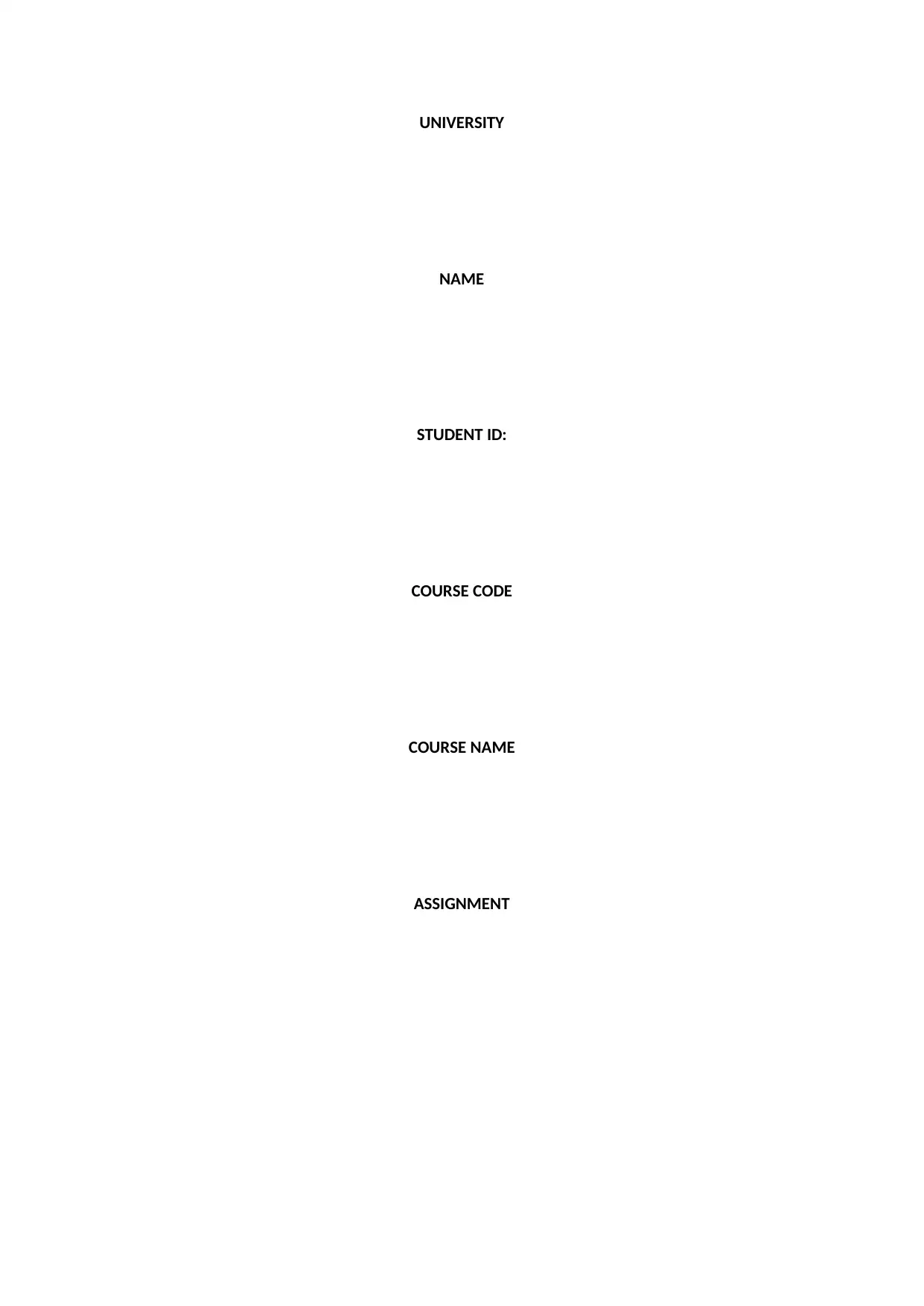
UNIVERSITY
NAME
STUDENT ID:
COURSE CODE
COURSE NAME
ASSIGNMENT
NAME
STUDENT ID:
COURSE CODE
COURSE NAME
ASSIGNMENT
Paraphrase This Document
Need a fresh take? Get an instant paraphrase of this document with our AI Paraphraser
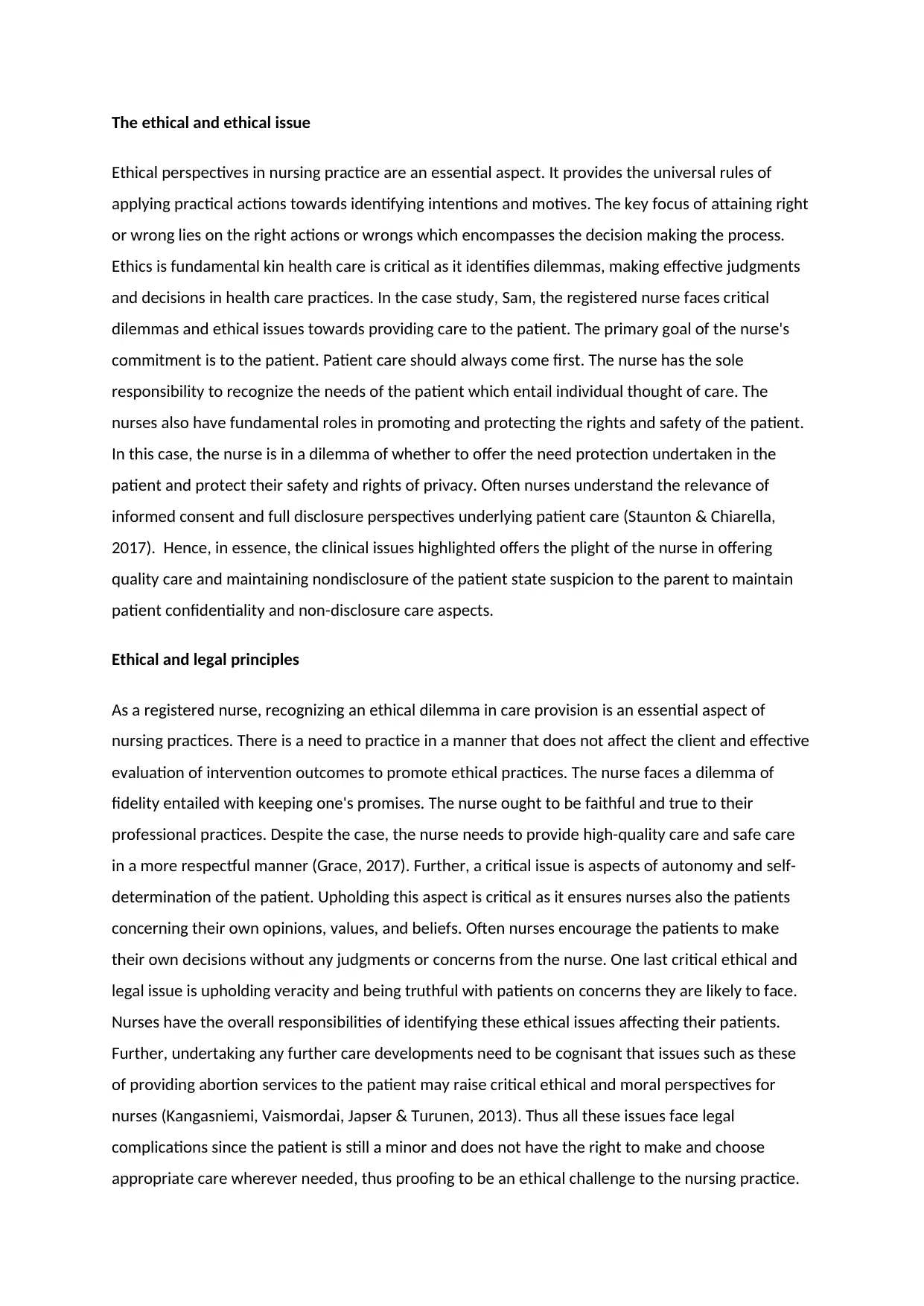
The ethical and ethical issue
Ethical perspectives in nursing practice are an essential aspect. It provides the universal rules of
applying practical actions towards identifying intentions and motives. The key focus of attaining right
or wrong lies on the right actions or wrongs which encompasses the decision making the process.
Ethics is fundamental kin health care is critical as it identifies dilemmas, making effective judgments
and decisions in health care practices. In the case study, Sam, the registered nurse faces critical
dilemmas and ethical issues towards providing care to the patient. The primary goal of the nurse's
commitment is to the patient. Patient care should always come first. The nurse has the sole
responsibility to recognize the needs of the patient which entail individual thought of care. The
nurses also have fundamental roles in promoting and protecting the rights and safety of the patient.
In this case, the nurse is in a dilemma of whether to offer the need protection undertaken in the
patient and protect their safety and rights of privacy. Often nurses understand the relevance of
informed consent and full disclosure perspectives underlying patient care (Staunton & Chiarella,
2017). Hence, in essence, the clinical issues highlighted offers the plight of the nurse in offering
quality care and maintaining nondisclosure of the patient state suspicion to the parent to maintain
patient confidentiality and non-disclosure care aspects.
Ethical and legal principles
As a registered nurse, recognizing an ethical dilemma in care provision is an essential aspect of
nursing practices. There is a need to practice in a manner that does not affect the client and effective
evaluation of intervention outcomes to promote ethical practices. The nurse faces a dilemma of
fidelity entailed with keeping one's promises. The nurse ought to be faithful and true to their
professional practices. Despite the case, the nurse needs to provide high-quality care and safe care
in a more respectful manner (Grace, 2017). Further, a critical issue is aspects of autonomy and self-
determination of the patient. Upholding this aspect is critical as it ensures nurses also the patients
concerning their own opinions, values, and beliefs. Often nurses encourage the patients to make
their own decisions without any judgments or concerns from the nurse. One last critical ethical and
legal issue is upholding veracity and being truthful with patients on concerns they are likely to face.
Nurses have the overall responsibilities of identifying these ethical issues affecting their patients.
Further, undertaking any further care developments need to be cognisant that issues such as these
of providing abortion services to the patient may raise critical ethical and moral perspectives for
nurses (Kangasniemi, Vaismordai, Japser & Turunen, 2013). Thus all these issues face legal
complications since the patient is still a minor and does not have the right to make and choose
appropriate care wherever needed, thus proofing to be an ethical challenge to the nursing practice.
Ethical perspectives in nursing practice are an essential aspect. It provides the universal rules of
applying practical actions towards identifying intentions and motives. The key focus of attaining right
or wrong lies on the right actions or wrongs which encompasses the decision making the process.
Ethics is fundamental kin health care is critical as it identifies dilemmas, making effective judgments
and decisions in health care practices. In the case study, Sam, the registered nurse faces critical
dilemmas and ethical issues towards providing care to the patient. The primary goal of the nurse's
commitment is to the patient. Patient care should always come first. The nurse has the sole
responsibility to recognize the needs of the patient which entail individual thought of care. The
nurses also have fundamental roles in promoting and protecting the rights and safety of the patient.
In this case, the nurse is in a dilemma of whether to offer the need protection undertaken in the
patient and protect their safety and rights of privacy. Often nurses understand the relevance of
informed consent and full disclosure perspectives underlying patient care (Staunton & Chiarella,
2017). Hence, in essence, the clinical issues highlighted offers the plight of the nurse in offering
quality care and maintaining nondisclosure of the patient state suspicion to the parent to maintain
patient confidentiality and non-disclosure care aspects.
Ethical and legal principles
As a registered nurse, recognizing an ethical dilemma in care provision is an essential aspect of
nursing practices. There is a need to practice in a manner that does not affect the client and effective
evaluation of intervention outcomes to promote ethical practices. The nurse faces a dilemma of
fidelity entailed with keeping one's promises. The nurse ought to be faithful and true to their
professional practices. Despite the case, the nurse needs to provide high-quality care and safe care
in a more respectful manner (Grace, 2017). Further, a critical issue is aspects of autonomy and self-
determination of the patient. Upholding this aspect is critical as it ensures nurses also the patients
concerning their own opinions, values, and beliefs. Often nurses encourage the patients to make
their own decisions without any judgments or concerns from the nurse. One last critical ethical and
legal issue is upholding veracity and being truthful with patients on concerns they are likely to face.
Nurses have the overall responsibilities of identifying these ethical issues affecting their patients.
Further, undertaking any further care developments need to be cognisant that issues such as these
of providing abortion services to the patient may raise critical ethical and moral perspectives for
nurses (Kangasniemi, Vaismordai, Japser & Turunen, 2013). Thus all these issues face legal
complications since the patient is still a minor and does not have the right to make and choose
appropriate care wherever needed, thus proofing to be an ethical challenge to the nursing practice.
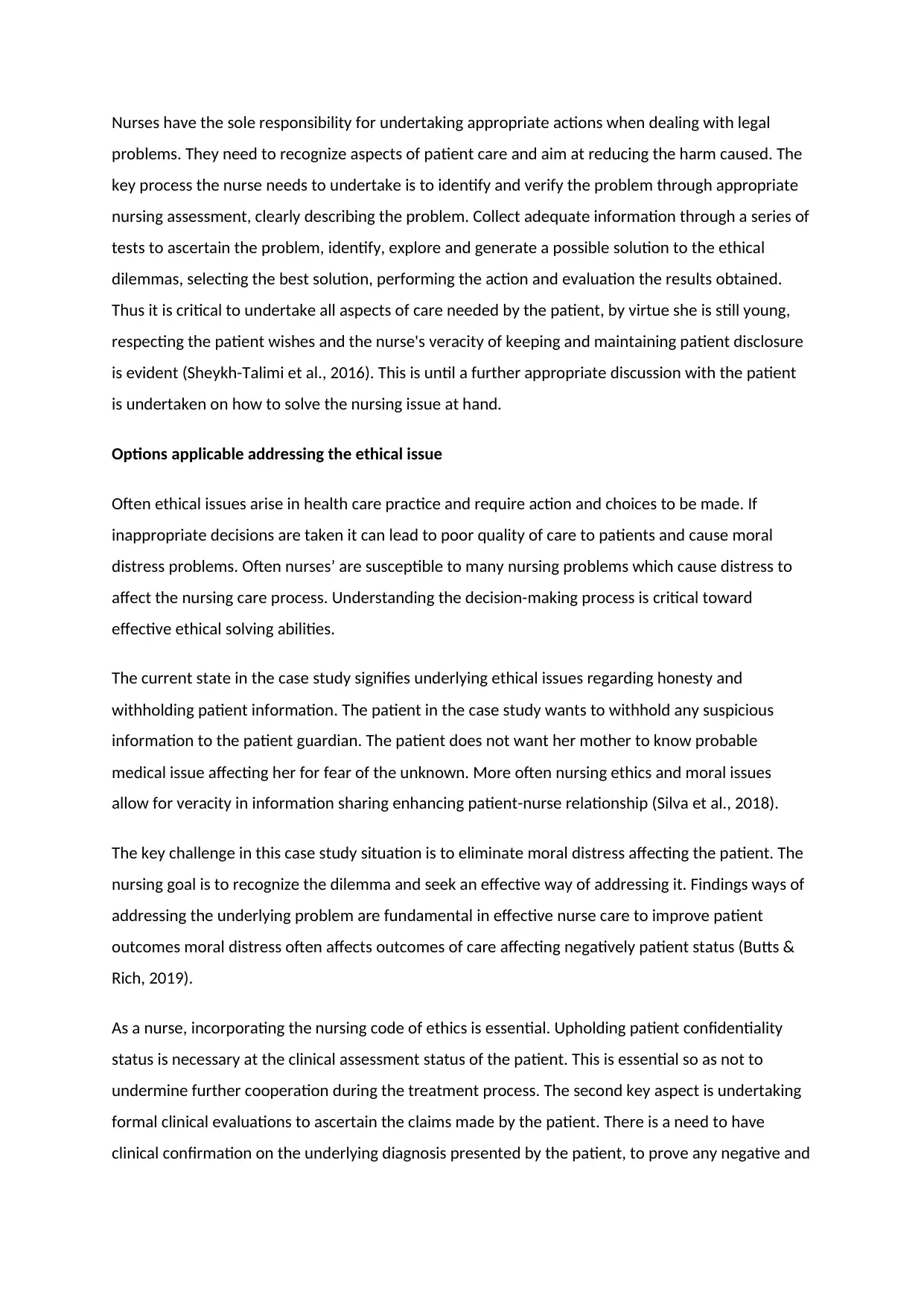
Nurses have the sole responsibility for undertaking appropriate actions when dealing with legal
problems. They need to recognize aspects of patient care and aim at reducing the harm caused. The
key process the nurse needs to undertake is to identify and verify the problem through appropriate
nursing assessment, clearly describing the problem. Collect adequate information through a series of
tests to ascertain the problem, identify, explore and generate a possible solution to the ethical
dilemmas, selecting the best solution, performing the action and evaluation the results obtained.
Thus it is critical to undertake all aspects of care needed by the patient, by virtue she is still young,
respecting the patient wishes and the nurse's veracity of keeping and maintaining patient disclosure
is evident (Sheykh-Talimi et al., 2016). This is until a further appropriate discussion with the patient
is undertaken on how to solve the nursing issue at hand.
Options applicable addressing the ethical issue
Often ethical issues arise in health care practice and require action and choices to be made. If
inappropriate decisions are taken it can lead to poor quality of care to patients and cause moral
distress problems. Often nurses’ are susceptible to many nursing problems which cause distress to
affect the nursing care process. Understanding the decision-making process is critical toward
effective ethical solving abilities.
The current state in the case study signifies underlying ethical issues regarding honesty and
withholding patient information. The patient in the case study wants to withhold any suspicious
information to the patient guardian. The patient does not want her mother to know probable
medical issue affecting her for fear of the unknown. More often nursing ethics and moral issues
allow for veracity in information sharing enhancing patient-nurse relationship (Silva et al., 2018).
The key challenge in this case study situation is to eliminate moral distress affecting the patient. The
nursing goal is to recognize the dilemma and seek an effective way of addressing it. Findings ways of
addressing the underlying problem are fundamental in effective nurse care to improve patient
outcomes moral distress often affects outcomes of care affecting negatively patient status (Butts &
Rich, 2019).
As a nurse, incorporating the nursing code of ethics is essential. Upholding patient confidentiality
status is necessary at the clinical assessment status of the patient. This is essential so as not to
undermine further cooperation during the treatment process. The second key aspect is undertaking
formal clinical evaluations to ascertain the claims made by the patient. There is a need to have
clinical confirmation on the underlying diagnosis presented by the patient, to prove any negative and
problems. They need to recognize aspects of patient care and aim at reducing the harm caused. The
key process the nurse needs to undertake is to identify and verify the problem through appropriate
nursing assessment, clearly describing the problem. Collect adequate information through a series of
tests to ascertain the problem, identify, explore and generate a possible solution to the ethical
dilemmas, selecting the best solution, performing the action and evaluation the results obtained.
Thus it is critical to undertake all aspects of care needed by the patient, by virtue she is still young,
respecting the patient wishes and the nurse's veracity of keeping and maintaining patient disclosure
is evident (Sheykh-Talimi et al., 2016). This is until a further appropriate discussion with the patient
is undertaken on how to solve the nursing issue at hand.
Options applicable addressing the ethical issue
Often ethical issues arise in health care practice and require action and choices to be made. If
inappropriate decisions are taken it can lead to poor quality of care to patients and cause moral
distress problems. Often nurses’ are susceptible to many nursing problems which cause distress to
affect the nursing care process. Understanding the decision-making process is critical toward
effective ethical solving abilities.
The current state in the case study signifies underlying ethical issues regarding honesty and
withholding patient information. The patient in the case study wants to withhold any suspicious
information to the patient guardian. The patient does not want her mother to know probable
medical issue affecting her for fear of the unknown. More often nursing ethics and moral issues
allow for veracity in information sharing enhancing patient-nurse relationship (Silva et al., 2018).
The key challenge in this case study situation is to eliminate moral distress affecting the patient. The
nursing goal is to recognize the dilemma and seek an effective way of addressing it. Findings ways of
addressing the underlying problem are fundamental in effective nurse care to improve patient
outcomes moral distress often affects outcomes of care affecting negatively patient status (Butts &
Rich, 2019).
As a nurse, incorporating the nursing code of ethics is essential. Upholding patient confidentiality
status is necessary at the clinical assessment status of the patient. This is essential so as not to
undermine further cooperation during the treatment process. The second key aspect is undertaking
formal clinical evaluations to ascertain the claims made by the patient. There is a need to have
clinical confirmation on the underlying diagnosis presented by the patient, to prove any negative and
⊘ This is a preview!⊘
Do you want full access?
Subscribe today to unlock all pages.

Trusted by 1+ million students worldwide
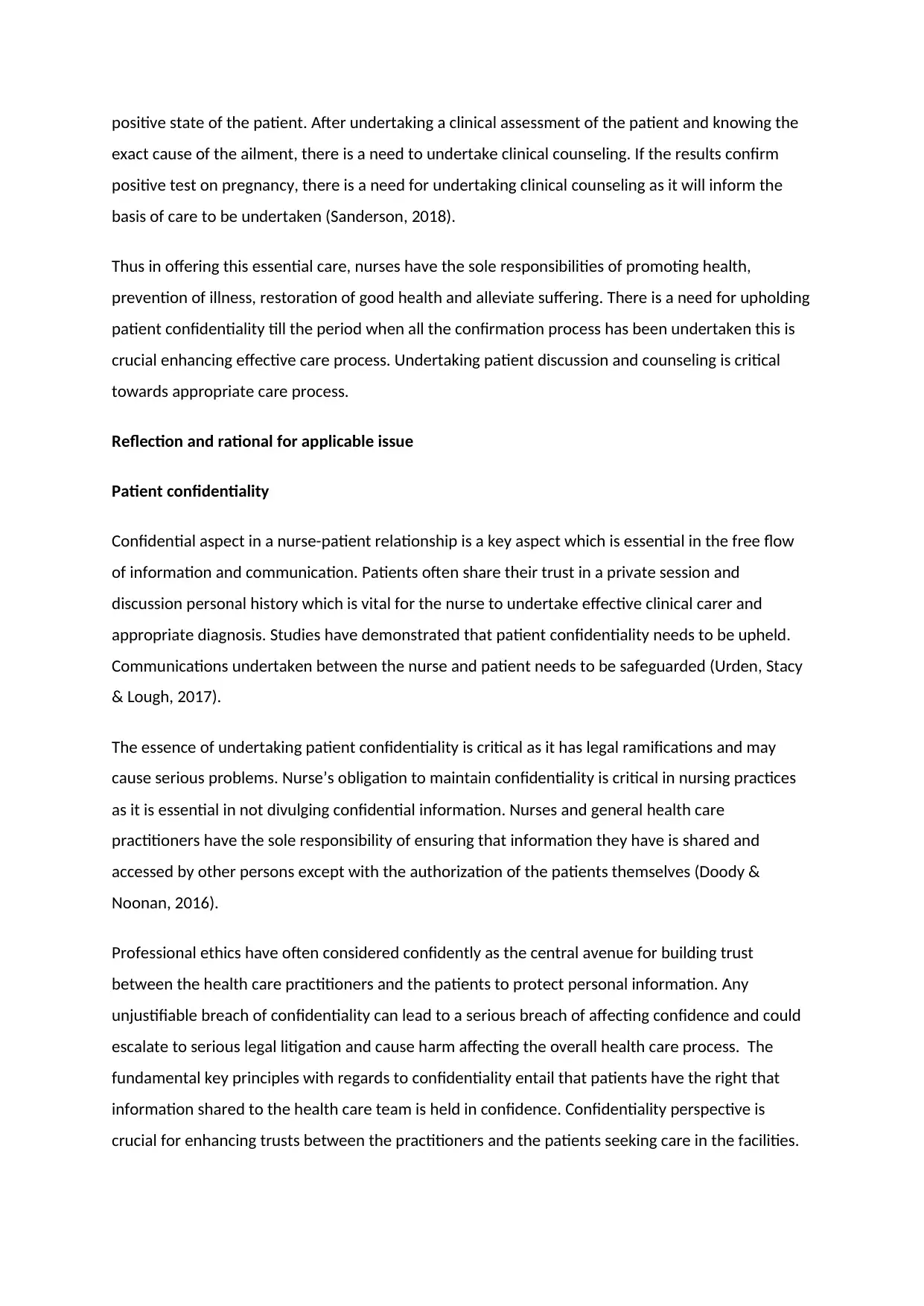
positive state of the patient. After undertaking a clinical assessment of the patient and knowing the
exact cause of the ailment, there is a need to undertake clinical counseling. If the results confirm
positive test on pregnancy, there is a need for undertaking clinical counseling as it will inform the
basis of care to be undertaken (Sanderson, 2018).
Thus in offering this essential care, nurses have the sole responsibilities of promoting health,
prevention of illness, restoration of good health and alleviate suffering. There is a need for upholding
patient confidentiality till the period when all the confirmation process has been undertaken this is
crucial enhancing effective care process. Undertaking patient discussion and counseling is critical
towards appropriate care process.
Reflection and rational for applicable issue
Patient confidentiality
Confidential aspect in a nurse-patient relationship is a key aspect which is essential in the free flow
of information and communication. Patients often share their trust in a private session and
discussion personal history which is vital for the nurse to undertake effective clinical carer and
appropriate diagnosis. Studies have demonstrated that patient confidentiality needs to be upheld.
Communications undertaken between the nurse and patient needs to be safeguarded (Urden, Stacy
& Lough, 2017).
The essence of undertaking patient confidentiality is critical as it has legal ramifications and may
cause serious problems. Nurse’s obligation to maintain confidentiality is critical in nursing practices
as it is essential in not divulging confidential information. Nurses and general health care
practitioners have the sole responsibility of ensuring that information they have is shared and
accessed by other persons except with the authorization of the patients themselves (Doody &
Noonan, 2016).
Professional ethics have often considered confidently as the central avenue for building trust
between the health care practitioners and the patients to protect personal information. Any
unjustifiable breach of confidentiality can lead to a serious breach of affecting confidence and could
escalate to serious legal litigation and cause harm affecting the overall health care process. The
fundamental key principles with regards to confidentiality entail that patients have the right that
information shared to the health care team is held in confidence. Confidentiality perspective is
crucial for enhancing trusts between the practitioners and the patients seeking care in the facilities.
exact cause of the ailment, there is a need to undertake clinical counseling. If the results confirm
positive test on pregnancy, there is a need for undertaking clinical counseling as it will inform the
basis of care to be undertaken (Sanderson, 2018).
Thus in offering this essential care, nurses have the sole responsibilities of promoting health,
prevention of illness, restoration of good health and alleviate suffering. There is a need for upholding
patient confidentiality till the period when all the confirmation process has been undertaken this is
crucial enhancing effective care process. Undertaking patient discussion and counseling is critical
towards appropriate care process.
Reflection and rational for applicable issue
Patient confidentiality
Confidential aspect in a nurse-patient relationship is a key aspect which is essential in the free flow
of information and communication. Patients often share their trust in a private session and
discussion personal history which is vital for the nurse to undertake effective clinical carer and
appropriate diagnosis. Studies have demonstrated that patient confidentiality needs to be upheld.
Communications undertaken between the nurse and patient needs to be safeguarded (Urden, Stacy
& Lough, 2017).
The essence of undertaking patient confidentiality is critical as it has legal ramifications and may
cause serious problems. Nurse’s obligation to maintain confidentiality is critical in nursing practices
as it is essential in not divulging confidential information. Nurses and general health care
practitioners have the sole responsibility of ensuring that information they have is shared and
accessed by other persons except with the authorization of the patients themselves (Doody &
Noonan, 2016).
Professional ethics have often considered confidently as the central avenue for building trust
between the health care practitioners and the patients to protect personal information. Any
unjustifiable breach of confidentiality can lead to a serious breach of affecting confidence and could
escalate to serious legal litigation and cause harm affecting the overall health care process. The
fundamental key principles with regards to confidentiality entail that patients have the right that
information shared to the health care team is held in confidence. Confidentiality perspective is
crucial for enhancing trusts between the practitioners and the patients seeking care in the facilities.
Paraphrase This Document
Need a fresh take? Get an instant paraphrase of this document with our AI Paraphraser
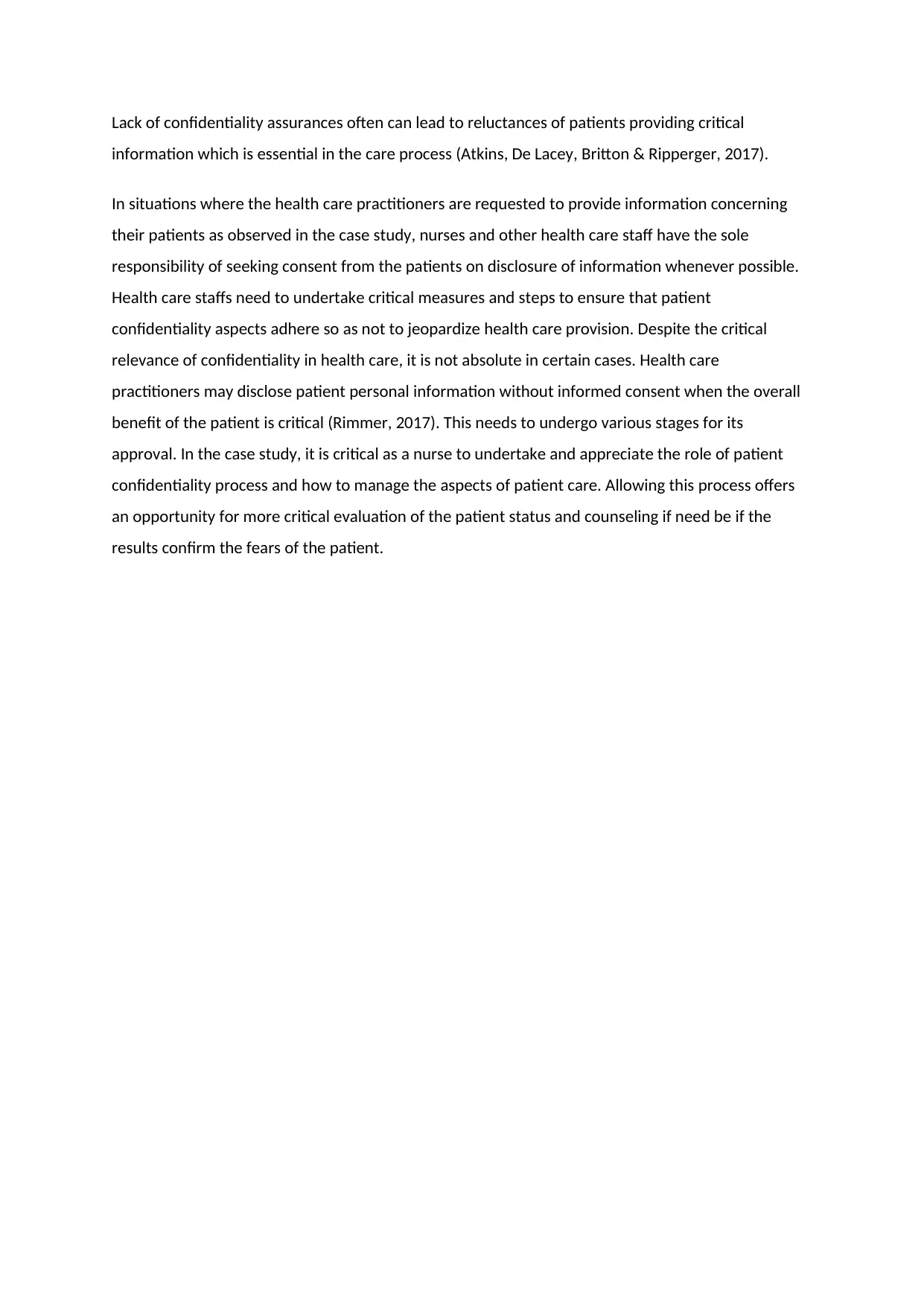
Lack of confidentiality assurances often can lead to reluctances of patients providing critical
information which is essential in the care process (Atkins, De Lacey, Britton & Ripperger, 2017).
In situations where the health care practitioners are requested to provide information concerning
their patients as observed in the case study, nurses and other health care staff have the sole
responsibility of seeking consent from the patients on disclosure of information whenever possible.
Health care staffs need to undertake critical measures and steps to ensure that patient
confidentiality aspects adhere so as not to jeopardize health care provision. Despite the critical
relevance of confidentiality in health care, it is not absolute in certain cases. Health care
practitioners may disclose patient personal information without informed consent when the overall
benefit of the patient is critical (Rimmer, 2017). This needs to undergo various stages for its
approval. In the case study, it is critical as a nurse to undertake and appreciate the role of patient
confidentiality process and how to manage the aspects of patient care. Allowing this process offers
an opportunity for more critical evaluation of the patient status and counseling if need be if the
results confirm the fears of the patient.
information which is essential in the care process (Atkins, De Lacey, Britton & Ripperger, 2017).
In situations where the health care practitioners are requested to provide information concerning
their patients as observed in the case study, nurses and other health care staff have the sole
responsibility of seeking consent from the patients on disclosure of information whenever possible.
Health care staffs need to undertake critical measures and steps to ensure that patient
confidentiality aspects adhere so as not to jeopardize health care provision. Despite the critical
relevance of confidentiality in health care, it is not absolute in certain cases. Health care
practitioners may disclose patient personal information without informed consent when the overall
benefit of the patient is critical (Rimmer, 2017). This needs to undergo various stages for its
approval. In the case study, it is critical as a nurse to undertake and appreciate the role of patient
confidentiality process and how to manage the aspects of patient care. Allowing this process offers
an opportunity for more critical evaluation of the patient status and counseling if need be if the
results confirm the fears of the patient.
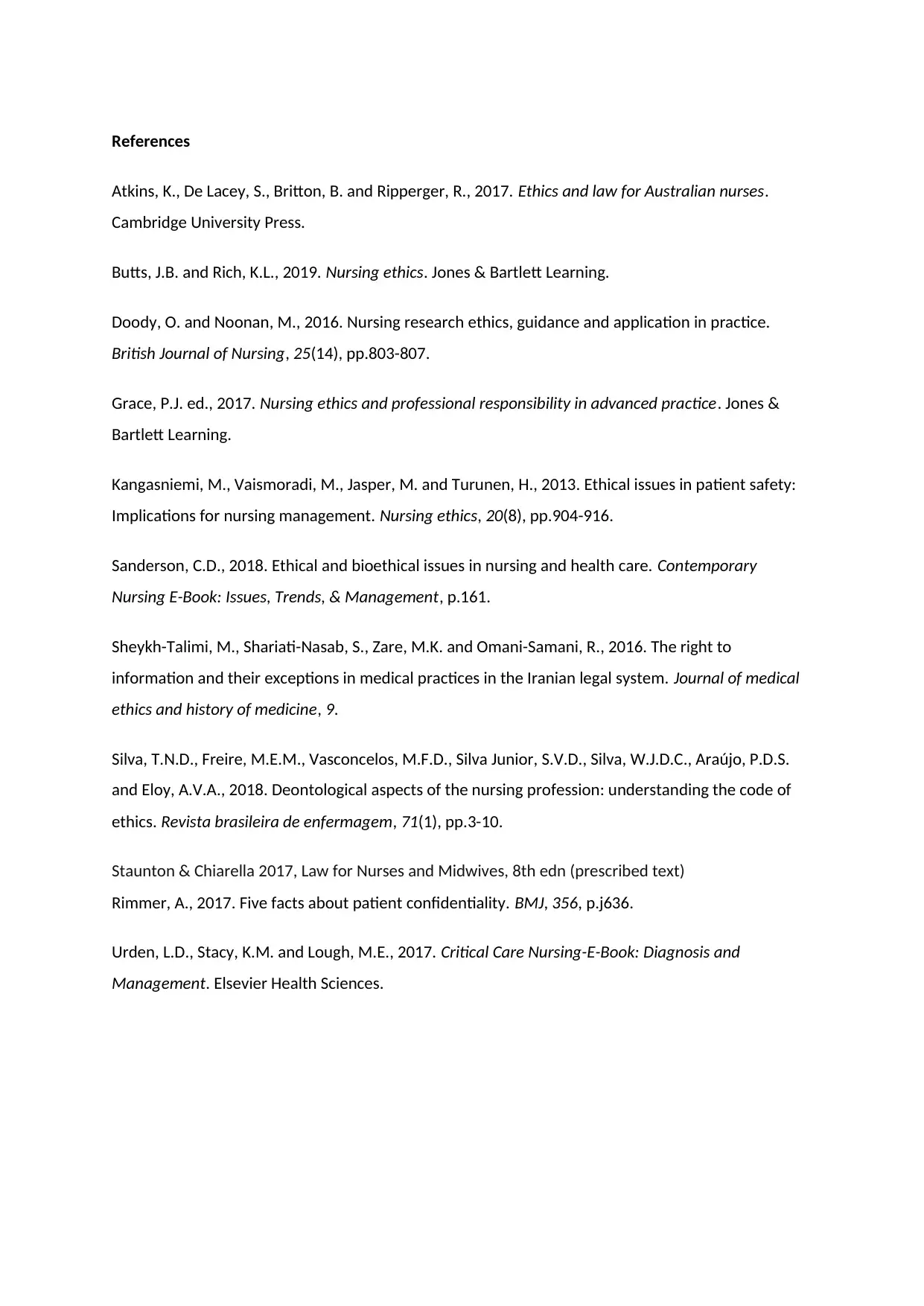
References
Atkins, K., De Lacey, S., Britton, B. and Ripperger, R., 2017. Ethics and law for Australian nurses.
Cambridge University Press.
Butts, J.B. and Rich, K.L., 2019. Nursing ethics. Jones & Bartlett Learning.
Doody, O. and Noonan, M., 2016. Nursing research ethics, guidance and application in practice.
British Journal of Nursing, 25(14), pp.803-807.
Grace, P.J. ed., 2017. Nursing ethics and professional responsibility in advanced practice. Jones &
Bartlett Learning.
Kangasniemi, M., Vaismoradi, M., Jasper, M. and Turunen, H., 2013. Ethical issues in patient safety:
Implications for nursing management. Nursing ethics, 20(8), pp.904-916.
Sanderson, C.D., 2018. Ethical and bioethical issues in nursing and health care. Contemporary
Nursing E-Book: Issues, Trends, & Management, p.161.
Sheykh-Talimi, M., Shariati-Nasab, S., Zare, M.K. and Omani-Samani, R., 2016. The right to
information and their exceptions in medical practices in the Iranian legal system. Journal of medical
ethics and history of medicine, 9.
Silva, T.N.D., Freire, M.E.M., Vasconcelos, M.F.D., Silva Junior, S.V.D., Silva, W.J.D.C., Araújo, P.D.S.
and Eloy, A.V.A., 2018. Deontological aspects of the nursing profession: understanding the code of
ethics. Revista brasileira de enfermagem, 71(1), pp.3-10.
Staunton & Chiarella 2017, Law for Nurses and Midwives, 8th edn (prescribed text)
Rimmer, A., 2017. Five facts about patient confidentiality. BMJ, 356, p.j636.
Urden, L.D., Stacy, K.M. and Lough, M.E., 2017. Critical Care Nursing-E-Book: Diagnosis and
Management. Elsevier Health Sciences.
Atkins, K., De Lacey, S., Britton, B. and Ripperger, R., 2017. Ethics and law for Australian nurses.
Cambridge University Press.
Butts, J.B. and Rich, K.L., 2019. Nursing ethics. Jones & Bartlett Learning.
Doody, O. and Noonan, M., 2016. Nursing research ethics, guidance and application in practice.
British Journal of Nursing, 25(14), pp.803-807.
Grace, P.J. ed., 2017. Nursing ethics and professional responsibility in advanced practice. Jones &
Bartlett Learning.
Kangasniemi, M., Vaismoradi, M., Jasper, M. and Turunen, H., 2013. Ethical issues in patient safety:
Implications for nursing management. Nursing ethics, 20(8), pp.904-916.
Sanderson, C.D., 2018. Ethical and bioethical issues in nursing and health care. Contemporary
Nursing E-Book: Issues, Trends, & Management, p.161.
Sheykh-Talimi, M., Shariati-Nasab, S., Zare, M.K. and Omani-Samani, R., 2016. The right to
information and their exceptions in medical practices in the Iranian legal system. Journal of medical
ethics and history of medicine, 9.
Silva, T.N.D., Freire, M.E.M., Vasconcelos, M.F.D., Silva Junior, S.V.D., Silva, W.J.D.C., Araújo, P.D.S.
and Eloy, A.V.A., 2018. Deontological aspects of the nursing profession: understanding the code of
ethics. Revista brasileira de enfermagem, 71(1), pp.3-10.
Staunton & Chiarella 2017, Law for Nurses and Midwives, 8th edn (prescribed text)
Rimmer, A., 2017. Five facts about patient confidentiality. BMJ, 356, p.j636.
Urden, L.D., Stacy, K.M. and Lough, M.E., 2017. Critical Care Nursing-E-Book: Diagnosis and
Management. Elsevier Health Sciences.
⊘ This is a preview!⊘
Do you want full access?
Subscribe today to unlock all pages.

Trusted by 1+ million students worldwide
1 out of 6
Related Documents
Your All-in-One AI-Powered Toolkit for Academic Success.
+13062052269
info@desklib.com
Available 24*7 on WhatsApp / Email
![[object Object]](/_next/static/media/star-bottom.7253800d.svg)
Unlock your academic potential
Copyright © 2020–2026 A2Z Services. All Rights Reserved. Developed and managed by ZUCOL.





